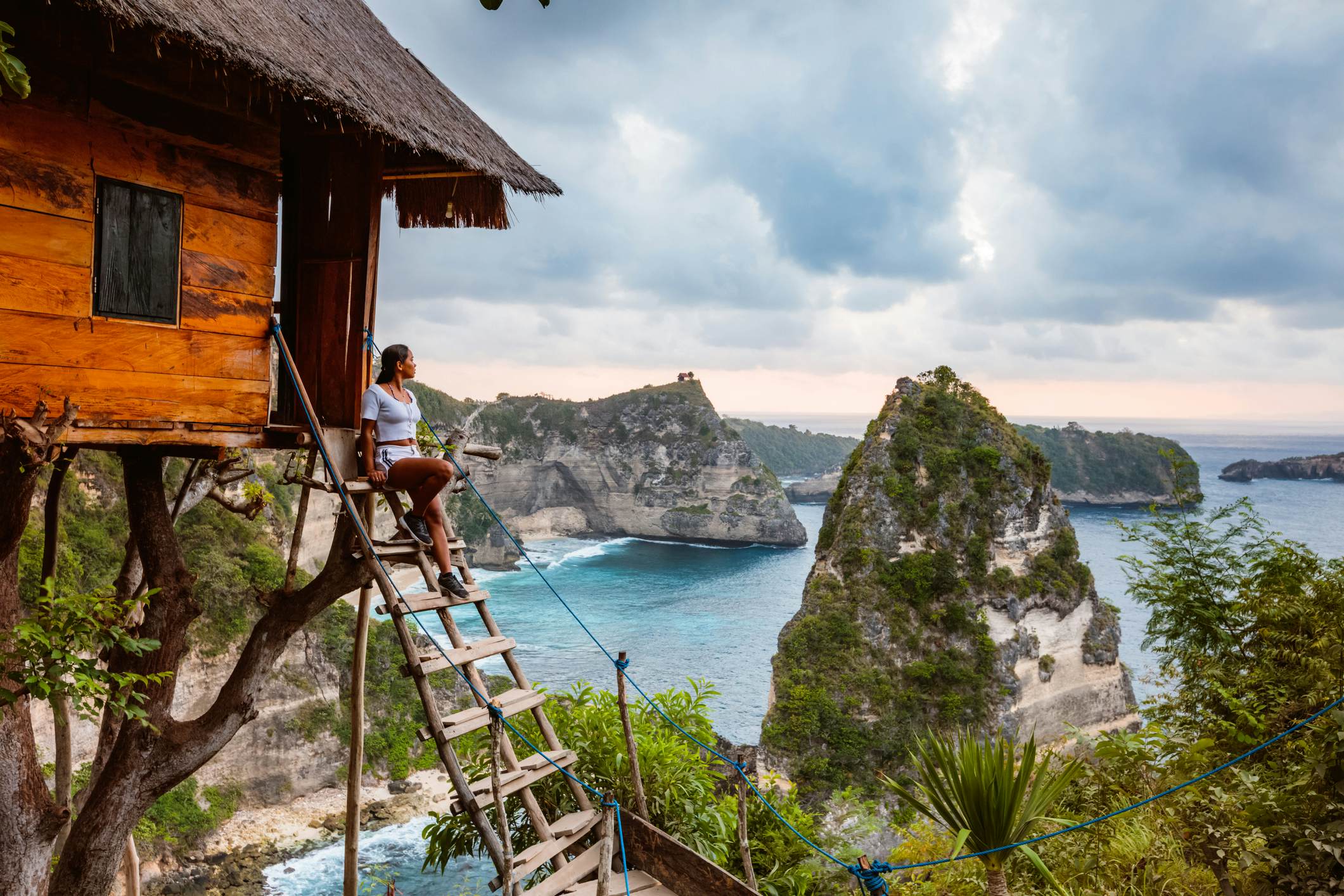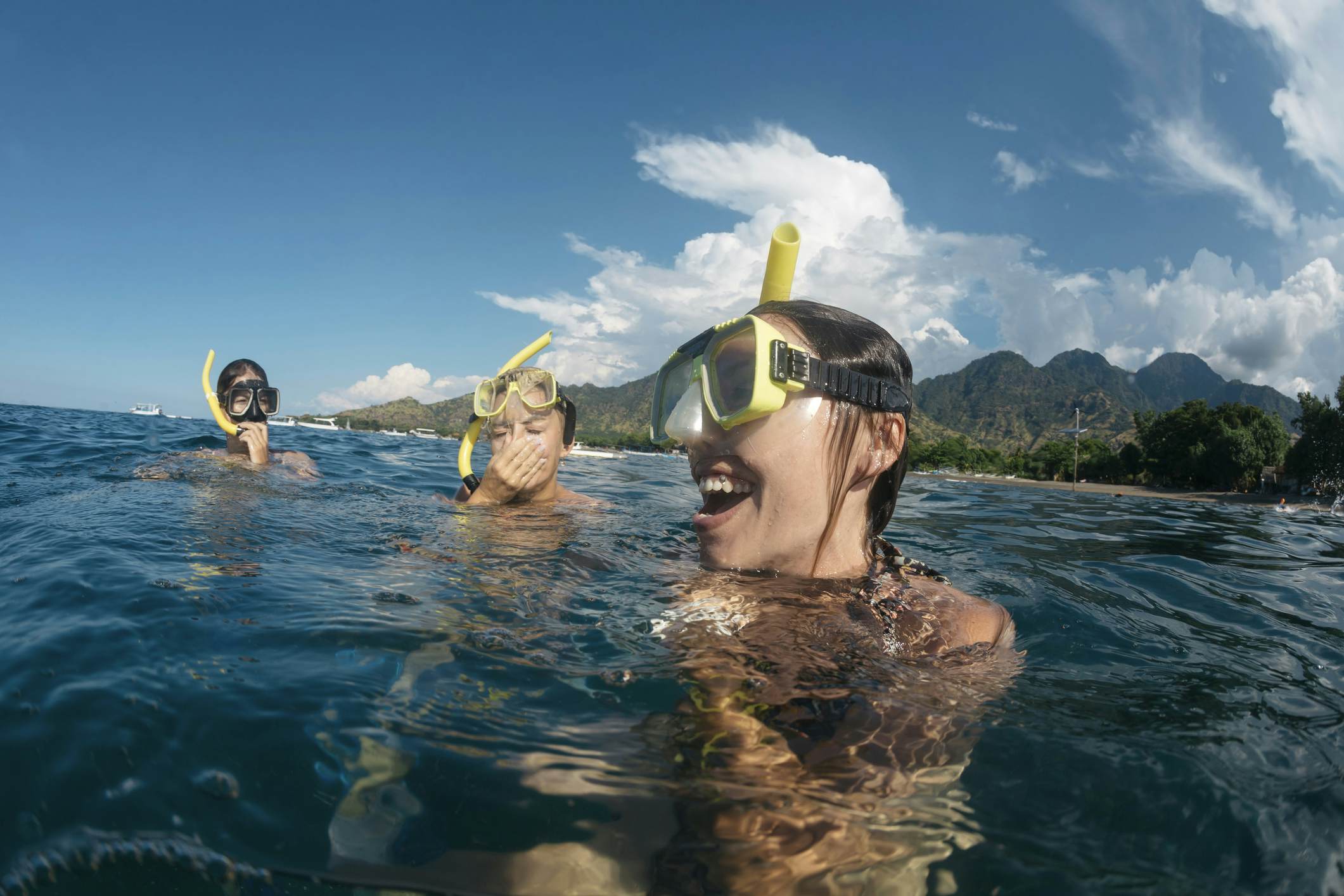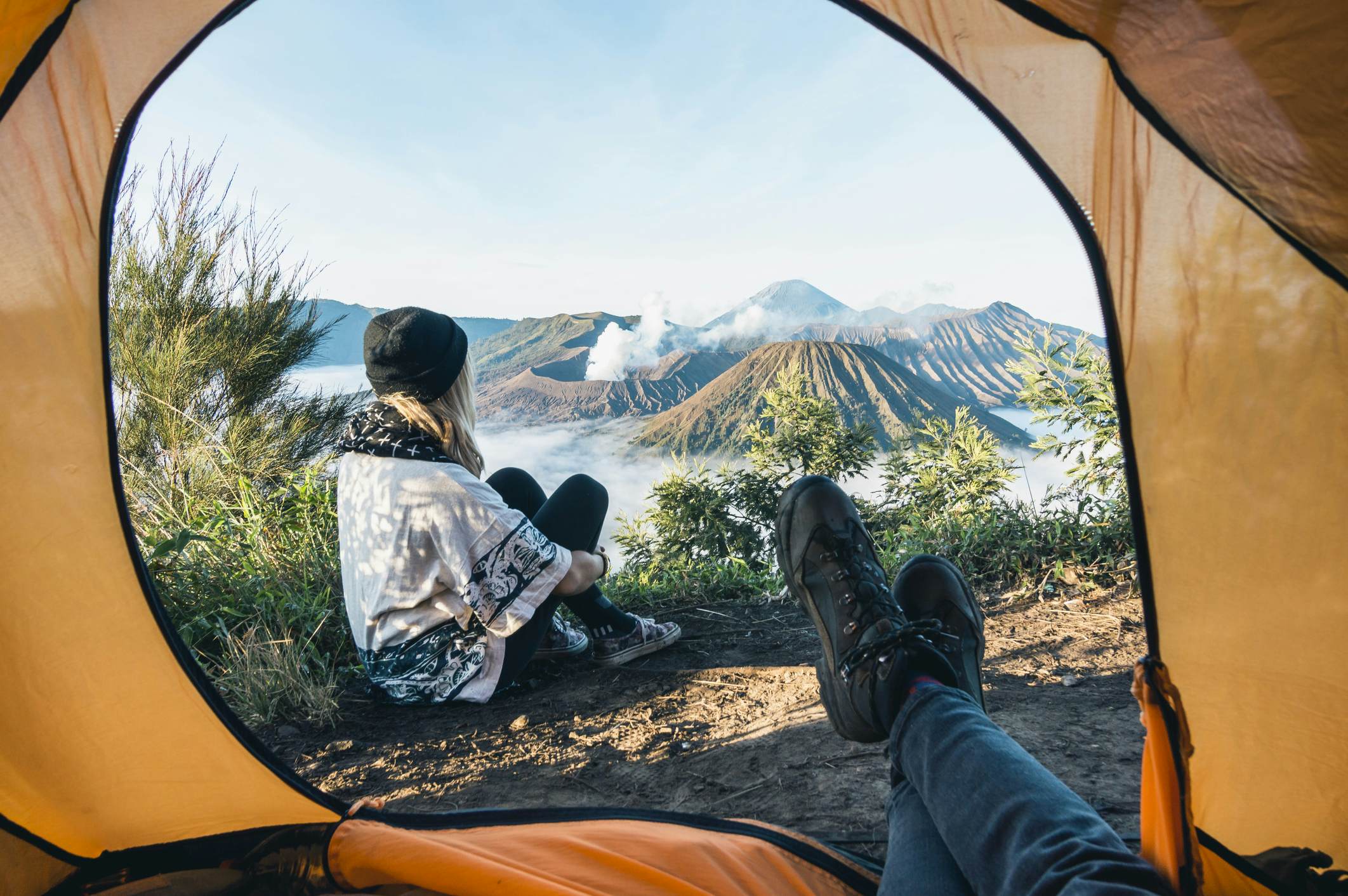15 things to know before going to Indonesia
9 min readIf you’re looking for culture, activities, wildlife or sheer adventure, Indonesia is one of the richest countries in the world. With an estimated 13,466 islands, it’s a whopper too. But Indonesia beyond Bali and Lombok (and the Gili Islands) remains largely unknown to many travelers. To pick just one example, Sumatra (80 times the size of Bali) is almost a world in itself. And yet people ask the question: “Is Indonesia worth visiting?”
Of course! This chain of islands – many culturally unique – stretches west to east across more than 5000km (3110 miles), making it one of the world’s most excitingly diverse countries. From getting ready before you go to important etiquette and safety information, here are 15 things you need to know to help you plan your trip to Indonesia.
1. Pick the best season depending on where you’re going
Most visitors to Bali do their best to avoid the rainy season (normally November to March), but there is really no bad time to visit Indonesia. Even at the height of the monsoon, rains are normally short and sharp and can form an unforgettably dramatic sound and light show. You will often have several bright sunny days between relatively brief storms. There are benefits too in reduced crowds (and dropped prices) since this is also low-season… but the greatest disadvantage comes with the first rains of the year that wash plastic trash (one of Indonesia’s greatest problems) down the rivers and onto the beaches.
At other extremes of the archipelago, West Papua and the Maluku Islands tend to have their dry seasons between September and March. Giant Sumatra (1000km/620 miles long) and Kalimantan (Indonesian Borneo) are big enough to have weather patterns all of their own. As a general rule, March to October is a good bet for avoiding the heavy rains in these areas. This can be important in jungle regions since some areas might be inaccessible during the rains.
2. Choose the right visa
It is possible for citizens of the UK, USA, Canada and Australia to be granted a Visa on Arrival (VOA) at some international airports, seaports or land crossings. However, it is best to apply for an e-Visa (e-VOA) at least 48 hours before departure instead. This can also be extended for a further 30 days. The initial 30-day tourist visa costs around US$35. Make sure you have at least six months before your passport expires before departure.
If you’re planning to stay longer in Indonesia to work or study, there are different visa options available. For citizens of other countries, check your visa options and apply online.
3. Learn a few words and phrases in Indonesian
It’s been said that one in 10 of all the world’s languages are spoken in Indonesia. Many islands have their own unique languages (some have hundreds), and English is spoken only in tourist areas. Fortunately for the traveler, Bahasa Indonesia (literally “Indonesia language”) is spoken by everyone, with the exception of the youngest preschool children and some of the elderly in rural areas.
Indonesian is a relatively easy language to learn and people from all walks of life will appreciate even minimal efforts to communicate in their own tongue. (Bahasa Indonesia shares much in common with Malay, so your efforts to learn the language will also serve you on trips to Malaysia, Sarawak and Sabah).

4. What to wear: pack for the tropics, but be respectful
Indonesia is tropical, and wherever you go in this country, you’re likely to want shorts, t-shirts or beach clothing much of the time. It can be surprisingly chilly in the highlands, however, and if you plan to do some trekking or volcano climbing, you will appreciate some warmer layers. Also beware that transportation (planes, trains and buses) are often surprisingly cold, and air-con units in shopping malls and hotels are often set to frigid levels, allowing fashionistas to dress in the sort of chic style you might associate with a European fall.
Even in beach areas, it’s considered extremely impolite to walk around shirtless (especially to enter a shop or restaurant), although you will see this often in the party areas of Bali. Male Indonesians will often be shirtless if in the comfort of their own home but would never dream of removing a shirt on someone else’s property.
If you are visiting temples, you will often be expected to wear a sarong and (for women) to cover your shoulders. Religious buildings and ceremonies in most parts of the country will often be off-limits if you’re wearing shorts. In most of Muslim Indonesia, dress codes are relatively relaxed, but you are likely to feel more comfortable (and appear more respectful) in long pants in communities that are predominantly Muslim.
5. Buy a local SIM card and download useful apps
Buy a local SIM card upon arrival at the airport so that you have calling credit and internet data wherever you go. It is inexpensive and easily done – staff will upload and activate the card for you within a couple of minutes. Make a note of your national consulate or embassy contact details in case of emergency.
Prior to traveling, download the transportation apps for Grab and/or Gojek. For solo travelers, this may be reassuring because drivers/riders are vetted and reviewed, and there is a security alert button to hit if you feel threatened.
6. Etiquette includes respecting your hosts’ religious beliefs
Indonesia is the world’s most populous Muslim country. While this is true (87% of the country’s 275 million people are Muslim), it is also misleading since – with the exception of Aceh (northern Sumatra), where Sharia law still prevails – Indonesia’s Islamic restrictions are very relaxed. Indonesian Muslims are also among some of the most hospitable people you will ever meet.
Vast tracts of the country are also predominantly Christian (large sections of the Maluku Islands, for example) and Bali itself is almost entirely Hindu. Intermingled with these “formal” religions – and sometimes almost inseparable from them – are an entire spectrum of animistic beliefs. Your trip will be all the richer for any attempts to understand and appreciate the beliefs of your hosts.
7. Kick off your shoes when entering a building
Most people realize that in Asia, you shouldn’t walk into a house wearing shoes, but it surprises many visitors to Indonesia that this also often extends to homestays and sometimes even to hotel rooms. While it is not strictly necessary, many owners of small souvenir shops also appreciate your politeness in leaving slip-off shoes at the door.

8. Never ask elderly people their names
In many traditional communities (including rural Bali) there’s a strong prohibition on speaking the name of an older person. The gods have a list of people who are “due to be called,” and there’s a pervasive belief that speaking a name can remind the gods that someone has been “overlooked.” Older women are invariably known simply as Nenek (grandmother), and older men are most commonly known as Bapak (mister) or Kakek (grandfather). In general, an older person should always be referred to respectfully as Pak (mister) or Ibu (mother).
9. Offer a gift to your hosts
If you’re visiting a family home, a small gift (an oleh oleh) might be appreciated – especially something that is representative of your own country. Locally bought sarongs – often available for just a couple of dollars – are a conveniently lightweight alternative. It’s considered uncouth for an Indonesian to make a big fuss about receiving a gift, so don’t feel offended if it is received with just a brief word of thanks and then carefully put away (still unwrapped) to be inspected later.
10. Staying safe in Indonesia: there’s a small risk of pickpocketing
In general, you are more at risk of crime in a European or American city than in Indonesia, and most trips are hassle-free. However, it’s worth staying alert in crowded bars and marketplaces as there’s a small risk of pickpocketing or being approached by scam artists here.
The vast majority of Indonesians from all regions (and all cultures and religions) are instilled with an almost inviolable tradition of hospitality towards strangers and travelers. Wherever you travel throughout the world’s greatest island nation – among the fabled Dayak ex-headhunter communities of Kalimantan or among the ex-cannibal communities of the Batak (Sumatra) or Asmat (West Papua) – you’re likely to realize very quickly that you are among friends. Almost uniquely, Lombok has a reputation for organized robberies on quiet roads, but elsewhere, community law is usually enough to ensure that such penjahat (evildoers) are promptly punished.

11. Be prepared for volcanoes and earthquakes
Volcanic eruptions and earthquakes are almost a daily event on the Ring of Fire. The excellent Volcano Discovery site and app provides up-to-the-moment details (and alerts) – and some fascinating background reading – for almost 200 Indonesian volcanoes. When there’s heightened activity, be sure to respect official advice concerning exclusion zones.
During a period of particularly regular and intense earthquakes, travel with a small lightweight (particularly sensitive) wind chime – the sort you’d usually string up in a garden. Hang it in the wardrobe (away from the fan) in hotel bedrooms, and it serves as a very effective early-warning system for tremors.
12. Drug laws are extremely strict in Indonesia
Indonesia has some of the strictest anti-drug laws on the planet. Possession of illegal narcotics can result in up to four years imprisonment, while a conviction for trafficking can often result in a death sentence – carried out by firing squad.
13. Know the laws regarding LGBTQI+ travelers
In Aceh, where pre-marital sex, in general, is considered a crime, same-sex relationships are also criminalized. This is the case to a lesser extent in the Sumatran city of Palembang. Throughout most of the rest of the country, discreet same-sex couples will find themselves welcomed.
Displays of public affection, regardless of sexual orientation, are considered inappropriate by typically conservative Indonesians. Parts of Indonesia – especially Maluku – have traditionally had a very natural acceptance of waria (considered to be men born with women’s souls), but increasing anti-LGBTQI+ rhetoric among politicians is making the situation harder for Indonesians in same-sex relationships. Few Western-style tourist hotels have an issue with same-sex couples sharing rooms, but, especially for travel in more off-the-beaten-track areas, increasing numbers of same-sex couples appreciate the anonymity of booking through sites like Airbnb.

14. Get up to date with vaccinations before you go
Travelers to Indonesia should check official sources such as their embassy or consulate for what vaccinations are required for your visit at least eight weeks before travel. Hepatitis A and B vaccines are recommended. Typhoid vaccinations and malaria prophylaxis are also recommended for some areas. If you are coming from a country with a prevalent risk of yellow fever, you may be required to produce a yellow fever certificate upon arrival.
15. Don’t drink the tap water
Even locals don’t drink tap water in Indonesia; they buy bottled water or boil it. To be on the safe side, where possible, use bottled water for ice and for cleaning teeth, too. Indonesia suffers from a problem with plastic garbage: if you are staying in a property for more than a couple of days (or are traveling in a group), consider buying a big 19-liter bottle (known locally as a galon), which you can then exchange for refills, rather than run through scores of liter bottles throughout your stay.
This article was first published Apr 11, 2022 and updated Dec 7, 2023.



